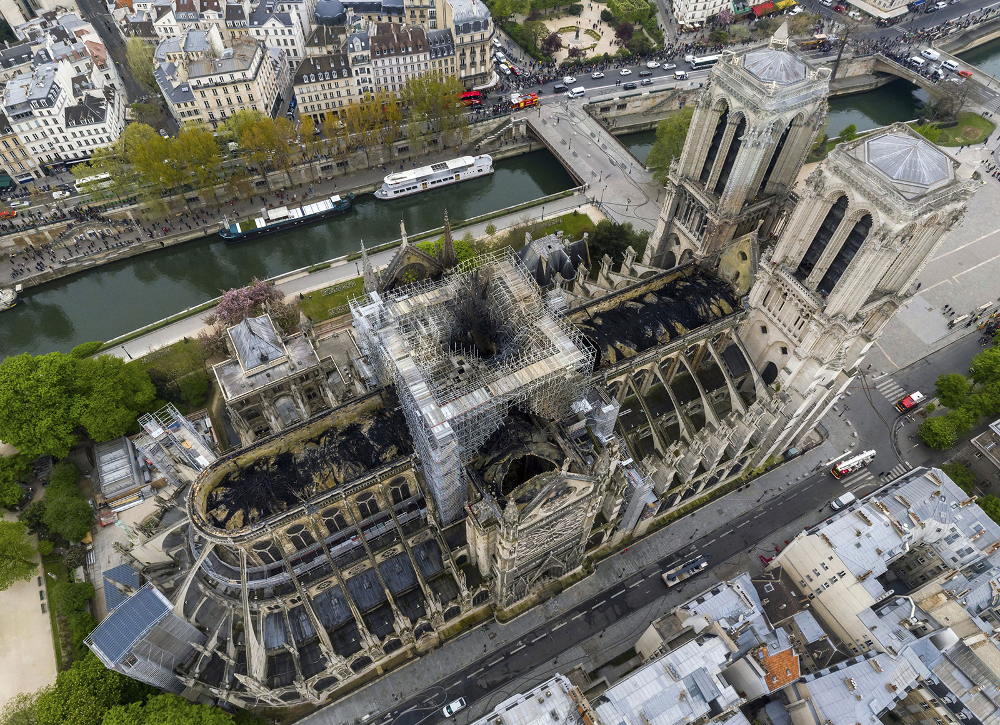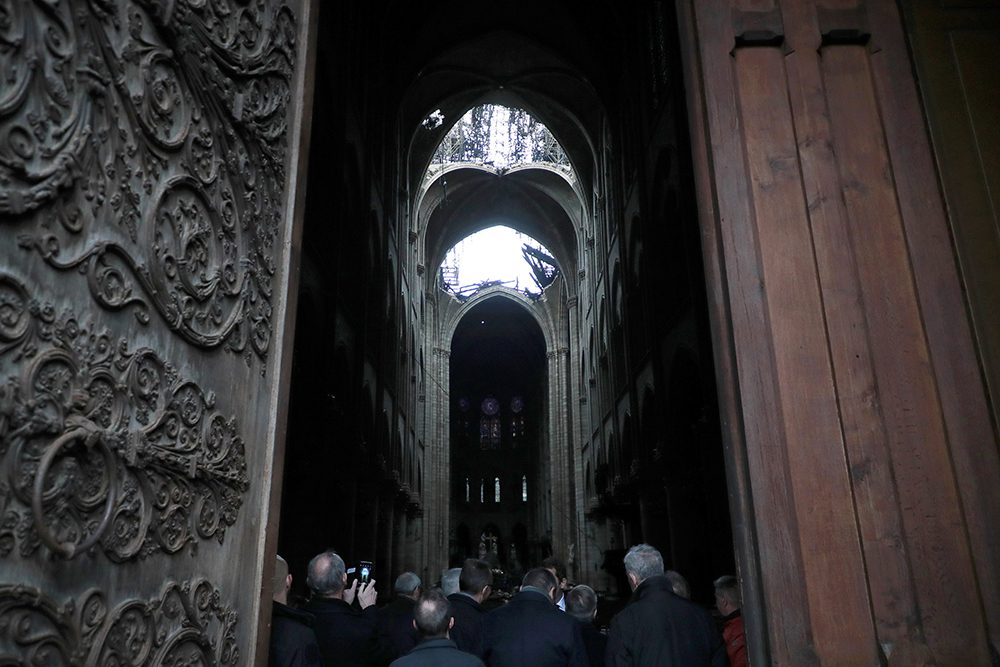
An aerial shot of the fire damage to Notre Dame Cathedral in central Paris on April 16. (Gigarama.ru via AP)
Holy Week and Easter are the busiest time in the Christian calendar, and losing a cathedral just as it begins would be the biggest logistical nightmare a bishop could imagine. Where to hold all those liturgies, how to accommodate all those people?
Michel Aupetit, the Roman Catholic archbishop of Paris, faced the first challenge on Monday (April 15) when the historic Notre Dame Cathedral suddenly went up in flames. With its roof burned off, walls possibly weakened and rubble strewn all over, the building will be closed for worship for years to come.
Finding other premises in Paris was less of a problem. Liturgies for Holy Thursday, Good Friday and the Easter Vigil on Saturday were promptly transferred to St. Sulpice, a church almost as big as the cathedral and located only four metro stops away.
Sunday morning's Easter Mass will be at St. Eustache, another imposing church only a short stroll from the cathedral. The famous organ there is even bigger than that at Notre Dame.
While Holy Week plans were smoothly revised, the challenge of restoring and reopening the 850-year-old cathedral has dominated public attention in the French capital. Pledges of funds have poured in from around the world while politicians and experts debate the best way to repair the Gothic monument.
"Our cathedral is on its knees," Aupetit said on Wednesday evening in St. Sulpice at the Chrism Mass, when priests join their bishop as he blesses holy oils for the year. That same evening, cathedrals around the country rang their bells in honor of Notre Dame.
Aupetit said that the cathedral would rise from the ashes. He also said that the Catholic Church itself, now more a cultural influence than a spiritual model, needs to be restored.
"We will rebuild our cathedral," Aupetit said. "We also have to put our church back on its feet."
The Notre Dame fire dramatically upset President Emmanuel Macron's schedule as well. On hearing the news on Monday, he canceled a long-awaited speech about planned reforms that had just been taped for broadcast and rushed to the burning building.
"We will rebuild the cathedral, even more beautiful than before, and I want it to be completed in five years," he said on Tuesday evening. Paris is due to host the Summer Olympics in 2024.
Wednesday's weekly Cabinet meeting was devoted solely to the Notre Dame issue. Afterward, Prime Minister Édouard Philippe announced a 75% tax break for donations to the cathedral's restoration.
There would also be an international competition, he said, to see "whether, as is often the case during the evolution of heritage, we should endow Notre Dame with a new spire that reflects the techniques and challenges of our era."
Pledges of funds for the reconstruction have risen rapidly and now total over a billion euros ($1.125 billion). When critics charged big donors did it for tax breaks, the wealthy Pinault family announced it would not claim fiscal relief for its 100 million euro contribution.
Advertisement
Expert assessments and follow-up statements from police and firefighters have revealed how much of Notre Dame's treasures were saved, but also how close the whole monument came to collapsing into smoldering rubble.
Led by the fire brigade's Catholic chaplain, the Rev. Jean-Marc Fournier, first responders were able to find and save the cathedral's most valuable relics, such as a ring of branches said to be the crown of thorns that Jesus wore, and consecrated Communion hosts from a tabernacle.
Police and culture ministry officials rescued most of the paintings in the cathedral's many side chapels, leaving only those firmly fixed to the walls, and rushed a collection of old vestments and altar vessels to the nearby City Hall.
The three priceless rose windows, which firefighters sprayed to keep from melting, all survived, as did the great organ with its 8,000 pipes. Photographs published after the fire was put out showed little smoke damage in the nave.
The firefighters' biggest accomplishment was to keep the blaze from consuming the iconic bell towers on the western facade. If either had fallen, the tons of bells crashing to the ground would have brought down the front of the cathedral and possibly the whole building.
Culture Minister Franck Riester said on Thursday that experts were still concerned about three key areas of the cathedral. The large stone gables over the northern and western rose windows had to be propped up because the roof that used to stabilize them has gone. If they fell, those rose windows could collapse with them.
Part of the south bell tower was especially fragile after being overheated and some chimera — Notre Dame's famous ghoulish animal statues — could fall off, possibly even hitting the grand organ below them, he added.
Macron invited 300 firefighters, police, municipal and Red Cross staffers to a special reception at the Élysée Palace on Thursday to thank them for their work.
"The country and the whole world were watching us and you were exemplary," he said. "You have been the perfect example of what we should be."
The discussion about how to restore Notre Dame to its former glory has not been as exemplary.
Bitter debates have broken out about rebuilding the rooftop spire that dramatically fell on Monday, and about the post-fire outpouring of funds for a monument that struggled to find financing beforehand.
"Not a day goes by since the Notre Dame fire without the president and his government showering us with statements each more absurd and scandalous than the other," the arts website La Tribune de l'Art thundered.

Holes are seen in the Notre Dame Cathedral ceiling in Paris, on April 16, 2019. Firefighters declared success Tuesday in a more than 12-hour battle to extinguish an inferno engulfing the iconic cathedral that claimed its spire and roof, but spared its bell towers and the purported crown of Christ. (Christophe Petit Tesson, Pool via AP)
The website blasted Macron for setting the tight five-year deadline because of the Olympics, rather than take all the time needed to restore the medieval monument. It also dismissed the idea of an international competition that might lead to a modernist spire erected in place of the neo-Gothic structure put up in 1859.
"We're speechless in the face of such lack of culture," it said.
A timber merchant has offered his best oak beams to replace the roof supports that burned so quickly, only to hear critics say France no longer had such massive oak trees to match the originals.
Jean-Michel Wilmotte, the star architect who designed the Russian Orthodox cathedral in Paris that opened three years ago, suggested rebuilding the roof frame in titanium to make it lighter and avoid future fires.
Historian Patrick Demouy noted the bombed-out cathedral in Reims was rebuilt after World War I with roof support of inflammable reinforced concrete. "It's not visible from the outside, so let's take advantage of new materials," he said.
The flood of contributions has also led some French to ask how so much money could be found when politicians say they don't have enough funds for public projects.
Notre Dame appealed two years ago for 150 million euros for urgent renovation work but fell far short of that goal. The government, which actually owns the national heritage monument, pledged 40 million euros over 10 years.
After that renovation work led to the fire, private and public donors rushed to pledge funds for the cathedral's restoration.
"You can see there are billionaires who have lots and lots of money," Philippe Martinez, head of the communist CGT trade union, told Franceinfo radio on Wednesday.
"This also shows the inequalities in this country," he said. "If they can give tens of millions to rebuild Notre Dame, let them stop telling us that there is no money to satisfy urgent social needs."
Manon Aubry, a leader of the left-wing party Unbowed France, said the list of donors seemed like a register of companies and individuals hiding money in tax havens.
"The simplest thing would be to start to pay their taxes and not finance a PR campaign by potentially putting their names on a stone at Notre Dame," she said.





